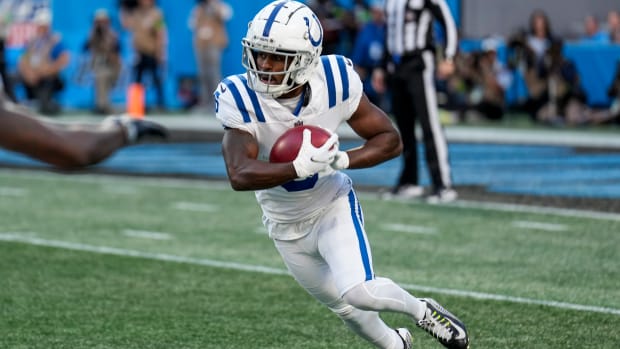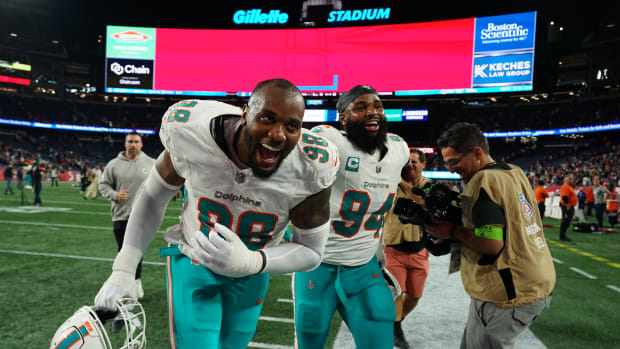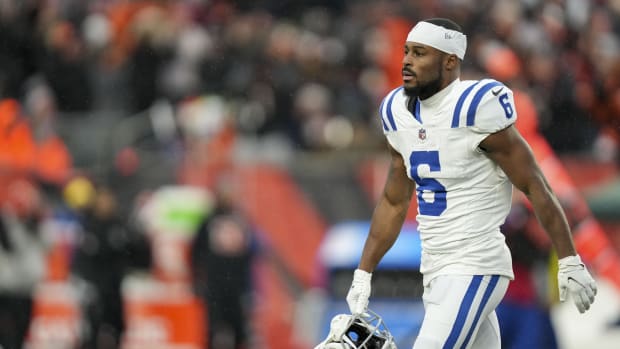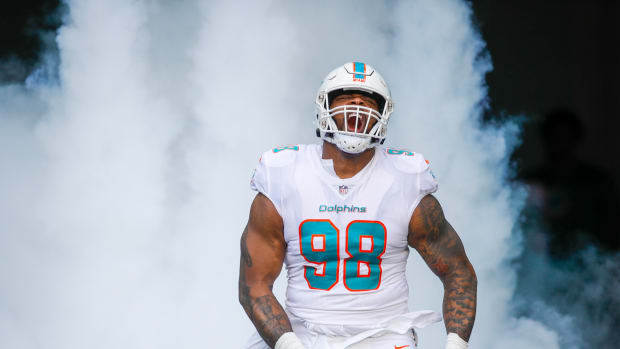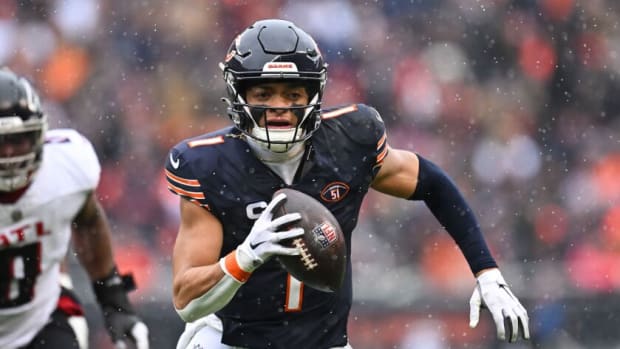Indianapolis Colts Use Daily Meetings to Address Nationwide Unrest
Football just wasn’t as important.
The Indianapolis Colts players took a break this week from the usual virtual offseason training activity routine in daily meetings. Colts owner Jim Irsay, general manager Chris Ballard, and head coach Frank Reich realized their players just needed to talk.
They were understandably upset and emotional about a nation that has been crying out in protests and violence about racism and police brutality. Protests continued, including in Indianapolis, for a ninth consecutive day. The team, like an outraged country, was sickened by the viral video of George Floyd being suffocated to death while in Minneapolis police custody last week.
“Honestly, these past two days we really haven’t even gone over football,” linebacker Bobby Okereke said in a Wednesday Zoom video conference call. “We haven’t installed. I think that’s just important for us as players to know that our management, from Coach Reich to Chris Ballard to Jim Irsay, really understand the gravity of the situation in our country.
“We’ve really just taken the time – really two hours each day to just sit and talk. People have shared their experiences and it’s just been a huge learning experience for everybody to just get on the same page and realize the influence we have as Indianapolis Colts players and to try and figure out a plan of action of what we can do moving forward.”
Running back Nyheim Hines said the interactions were “powerful” and “passionate,” coming from blacks and whites, coaches, and players.
“Just seeing the unity that we have with the brotherhood,” Hines said. “It doesn’t really matter what’s really going on in the world, all we’ve got is each other. We’re all people. That’s what I really got out of it.
“Despite all the bad things going on in the world — blacks, whites, all sorts of ethnicities on a football team bonding together as one and all of us saying we’ve got each other’s back. It was really moving.”
Hines said Ballard and Reich set the tone with meaningful talks. Players then shared personal accounts of dealing with racism and police brutality.
“It was very emotional. There were a lot of tears, a lot of compassion and everyone being sympathetic toward each other,” Okereke said. “I think as we transitioned to the next day a lot of coaches spoke, a lot of players – non-black and black players spoke. Just everybody sharing their experiences and sharing how much the day before touched them and meant to them. I think for a lot of players on this team – players, staff, coaches – yesterday when we first had that conversation, that was probably one of the most impactful social conversations they’ve ever had in their life and for me, easily. I think it’s just been incredible having these conversations and I think we all need to in our circles going forward to have the change in this country we need.”
Hines said race isn’t usually discussed in the Colts locker room — he likened it to when kids play on the playground and don’t care what color anyone is.
“I see white guys, black guys, and all of us hang out together,” Hines said. “It’s never been a problem, so that’s why it’s never been talked about.”
Okereke, 23, joined the Colts as a third-round pick last year, when he gradually progressed with 65 total tackles to make the Pro Football Writers Association’s All-Rookie Team.
When given his opportunity to speak, he talked about growing up in Tustin, Calif., as a member of one of the only black families in his environment. He didn’t face overt racism, but sensed it.
He shared his reaction to seeing the Floyd video.
“I think it was just sad to watch that video and to just know all the other accounts of people who have faced police brutality, whether it’s caught on video or the ones that haven’t been,” Okereke said. “But I just think it’s been positive to see – especially people in my young generation – kind of the momentum on social media, people in the protest, kind of just seeing everybody on the same page realizing that racism is an issue in this country and that there is a lot we can do about it and police brutality is one of the main issues that we need to attack in this country.”
Former San Francisco 49ers quarterback Colin Kaepernick and other NFL players created a national controversy in 2016, when they took a knee during the National Anthem before games to raise awareness about racism and police brutality. Kaepernick was told he would be released and opted out of his contract. No other team signed him.
President Donald Trump and Vice President Mike Pence criticized kneeling players for disrespecting the American flag. That’s the reason Pence, a Hoosier native and former Indiana Governor, gave for walking out of a 2017 Colts game at Lucas Oil Stadium after players kneeled during the National Anthem.
During one of the meetings, a Colts player suggested how they needed to use their NFL platform to impact positive social change.
“The people with a platform really just have to step up,” Hines said, “and that’s how things will get better.”
Hines said his family has a history in the civil rights movement. His grandmother marched with Martin Luther King, Jr., and his grandfather participated in the Greensboro, N.C., sit-ins.
“It’s something I should be more vocal about,” he said of racial equality. “It’s family experience. In life, you really only go as far as experience takes you. So I should really do a better job at leading because I’ve had family members that have peacefully protested.
“The looting and rioting that’s going on, it hasn’t been great. It’s not great and that’s not really what should be going on. I just think guys like me and other athletes who know things about it, we should lead and protest and be more active in the community.”
Okereke and his teammates are wondering what can be done to continue the momentum of raising awareness in Indianapolis.
“We kind of floated around some ideas, whether we can have a racial or social awareness month – something like that,” he said. “I know it’s a bummer we’re not all in Indianapolis, but I think once we all have the opportunity to get into Indianapolis, everybody is going to feel that drive and that purpose to get together whether it’s going downtown in Indianapolis or doing something at our facility. I think everybody realizes that we all have to take solidarity in this issue and we have to come together and do something together.”
(Phillip B. Wilson has covered the Indianapolis Colts for more than two decades and authored the 2013 book 100 Things Colts Fans Should Know & Do Before They Die. He’s on Twitter @pwilson24, on Facebook at @allcoltswithphilb and @100thingscoltsfans, and his email is phillipbwilson24@yahoo.com.)
